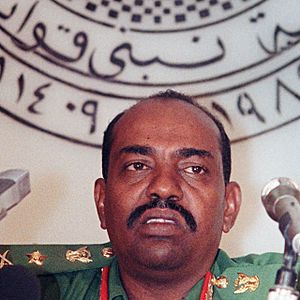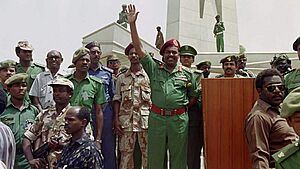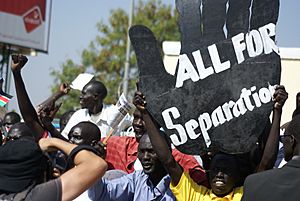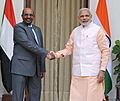Omar al-Bashir facts for kids
Quick facts for kids
Omar al-Bashir
|
|
|---|---|
|
عمر البشير
|
|
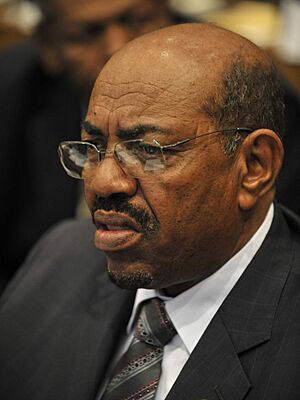
Al-Bashir in 2009
|
|
| 4th President of Sudan | |
| In office 16 October 1993 – 11 April 2019 |
|
| Prime Minister |
See list
Bakri Hassan Saleh
Motazz Moussa Mohamed Tahir Ayala |
| Vice President |
See list
First Vice Presidents
Zubair Mohamed Salih Ali Osman Taha John Garang Salva Kiir Mayardit Ali Osman Taha Bakri Hassan Saleh Ahmed Awad Ibn Auf Second Vice Presidents George Kongor Arop Moses Kacoul Machar Ali Osman Taha Al-Haj Adam Youssef Hassabu Mohd. Abdalrahman Osman Mohamed Yousif Kibir |
| Preceded by | Himself (as Chairman of the RCC) |
| Succeeded by | Ahmed Awad Ibn Auf (as Chairman of the Transitional Military Council) |
| Chairman of the Revolutionary Command Council for National Salvation | |
| In office 30 June 1989 – 16 October 1993 |
|
| Deputy | Zubair Mohamed Salih |
| Preceded by | Ahmed al-Mirghani (as President) |
| Succeeded by | Himself (as President) |
| Personal details | |
| Born |
Omar Hassan Ahmad al-Bashir
1 January 1944 Hosh Bannaga, then part of Anglo-Egyptian Sudan |
| Political party | National Congress Party (1998–2019) |
| Spouses |
|
| Alma mater | Egyptian Military College |
| Military service | |
| Allegiance | |
| Branch | |
| Service years | 1960–2019 |
| Rank | |
| Conflicts |
|
| Criminal details | |
| Criminal status | Claimed by ICC |
| Conviction(s) | Money laundering Corruption |
| Criminal penalty | Two years in prison |
|
Date apprehended
|
17 April 2019 |
| Imprisoned at | Incarcerated at the Kobar Prison, Khartoum, Sudan |
Omar Hassan Ahmad al-Bashir (born 1 January 1944) is a former military officer and politician from Sudan. He was Sudan's leader from 1989 until 2019. He came to power through a military takeover and later became president.
In 2019, he was removed from power by the military. After that, he was put in prison and found guilty of corruption. He also faced serious accusations from the International Criminal Court (ICC) regarding events in Darfur. In 2020, the government of Sudan agreed to hand him over to the ICC for trial.
During his time as leader, his government helped end the Second Sudanese Civil War in 2005. This led to South Sudan becoming a separate country in 2011. He also oversaw the War in Darfur, which caused many people to be displaced.
Contents
Early Life and Military Career
Omar al-Bashir was born on January 1, 1944, in Hosh Bannaga, a village near Khartoum, Sudan. His family belonged to the Ja'alin tribe. As a child, he loved playing football, often playing in defense.
He went to the Sudanese Military College for his primary education. Later, his family moved to Khartoum North, where he finished his secondary education. He is married to his cousin, Fatima Khalid, and also to Widad Babiker Omer, who had children from her first marriage. Al-Bashir does not have any children of his own.
In 1975, al-Bashir was sent to the United Arab Emirates as a military representative. When he returned to Sudan, he became a garrison commander. In 1981, he became the commander of an armored parachute brigade.
Becoming President of Sudan
The 1989 Military Takeover
On June 30, 1989, Omar al-Bashir, then a colonel in the Sudanese Army, led a group of officers in a peaceful military takeover. They removed the government of Prime Minister Sadiq al-Mahdi.
After taking power, al-Bashir's new military government stopped political parties from operating. They also introduced an Islamic legal system across the country. He became the head of a new group called the Revolutionary Command Council for National Salvation. This group held both law-making and executive powers during what was called a "transitional period."
Al-Bashir also became the head of state, prime minister, and head of the armed forces. He worked closely with Hassan al-Turabi, a religious leader, to make Islamic law a bigger part of Sudan's system. He also removed people he saw as opponents from the army and banned political groups and independent newspapers.
Becoming President and Elections
On October 16, 1993, al-Bashir became the official President of Sudan. He then ended the Revolutionary Command Council and took all its powers for himself.
He was elected president in the 1996 Sudanese general election. He was the only candidate allowed to run in that election. In 1998, a new constitution was put in place, which allowed some political groups to form, but al-Bashir's National Congress Party remained the most powerful.
He was re-elected in the 2000 Sudanese general election. From 2005 to 2010, a temporary government was set up as part of a peace agreement that ended the civil war. Al-Bashir was re-elected again in the 2010 Sudanese general election. However, observers from Europe and the Carter Center said these elections did not meet international standards.
Key Challenges During His Rule
Relationship with the United States
After al-Bashir took power, Sudan was accused of supporting certain groups that the United States considered terrorist organizations. Because of this, the U.S. listed Sudan as a "state sponsor of terrorism" in 1993. This led to the U.S. putting economic restrictions on Sudan.
In the mid-1990s, Sudan tried to improve its relationship with the U.S. Al-Bashir even allowed his defense minister to have secret talks with U.S. officials. In 1996, the U.S. asked Sudan to expel Osama bin Laden, and al-Bashir agreed. Despite these efforts, the U.S. imposed more economic restrictions on Sudan in 1997.
The Separation of South Sudan
When al-Bashir came to power, the Second Sudanese Civil War had been going on for nine years. This war was mainly between the government and the Sudan People's Liberation Army in the south. Millions of people in the south were affected by the war, and many lives were lost.
International pressure grew for al-Bashir to end the conflict. In 2005, a peace agreement was signed, which gave Southern Sudan some independence for six years. This agreement also allowed for a vote on full independence later. On July 9, 2011, after a vote, the region of Southern Sudan officially became a new country called South Sudan.
The Conflict in Darfur
The War in Darfur began in 2003. Rebel groups accused the government of ignoring Darfur and favoring Arab groups over non-Arab groups. This led to armed conflict.
There are different estimates for the number of deaths in this conflict. The Sudanese government claimed around 10,000 deaths, while other reports suggested much higher numbers. The conflict caused over 2.5 million people to leave their homes.
The International Criminal Court (ICC) accused al-Bashir of being responsible for serious crimes in Darfur. They issued an arrest warrant for him in 2009. However, Sudan is not a member of the ICC, and al-Bashir refused to recognize the warrant. Many countries, especially in Africa and the Middle East, also opposed the warrant.
Al-Bashir signed two peace agreements for Darfur: the 2006 Darfur Peace Agreement and the 2011 Doha Agreement. These agreements aimed to bring peace and stability to the region.
Removal from Power and Aftermath
Ousting from Power
Starting in December 2018, al-Bashir faced large protests across Sudan. People demanded that he step down. On April 11, 2019, the Sudanese Armed Forces removed him from his position in a military takeover.
He was immediately placed under house arrest. At the time, al-Bashir had been the longest-serving leader of Sudan since the country became independent. The army also arrested his ministers and formed a temporary military council.
Life After Presidency
On April 17, 2019, al-Bashir was moved from house arrest to Kobar Prison in Khartoum. In May 2019, prosecutors charged him with encouraging and taking part in the killing of protesters.
A trial for corruption and money laundering began in the following months. On December 14, 2019, he was found guilty of these charges and sentenced to two years in prison.
His trial regarding the 1989 takeover that brought him to power started on July 21, 2020. On December 20, 2022, al-Bashir stated that he was fully responsible for the events of June 30, 1989. This trial is still ongoing.
International Criminal Court (ICC)
In November 2019, a group called the Forces of Freedom and Change agreed that al-Bashir should be handed over to the ICC after his corruption trial. In February 2020, Sudan's ruling military council officially agreed to transfer him to the ICC in The Hague to face charges related to Darfur.
In October 2020, the ICC's chief prosecutor visited Sudan to discuss al-Bashir's transfer. As part of a deal with rebel groups from Darfur, the government agreed to set up a special court for war crimes, which would include al-Bashir.
Current Situation
On April 26, 2023, the Sudanese Armed Forces announced that al-Bashir and other former officials were moved from Kobar Prison to a military hospital due to ongoing conflict in Sudan. They were later moved to another facility in Merowe in September 2024. Al-Bashir is reported to have heart problems.
Images for kids
See also
 In Spanish: Omar Hasán Ahmad al Bashir para niños
In Spanish: Omar Hasán Ahmad al Bashir para niños
- Politics of Sudan
- History of Sudan
 | Audre Lorde |
 | John Berry Meachum |
 | Ferdinand Lee Barnett |


